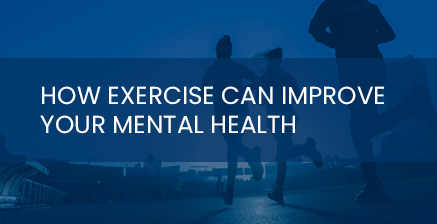Although your athletes may exercise purely for performance reasons, there are lots of other added health benefits that come with physical exercise and ways that you can work these into your programmes to benefit your athletes and their overall health.
Whether you’re a Strength and Conditioning Coach training elite athletes, or a PT training the general public – knowing what other health benefits come with physical exercise can help you understand what your client or athlete needs and how you can help them.
As well as improving physical health, let’s look at what areas of mental health exercise can improve too:
Exercise to combat depression
Research and studies show that regular exercise can treat mild to moderate depression as effectively as medication, but without any negative side effects. Exercise is a proven mood booster, and regularly moving your body can decrease symptoms of depression. Why? Well, as you may be aware, physical exercise increases endorphin levels, A.K.A, the ‘feel good’ chemical. Endorphins are produced by the brain and spinal cord and produce feelings of happiness and euphoria. Along with increasing endorphins, regular exercise promotes other changes in the brain including, neural growth, reduced inflammation, and new activity patterns that promote feelings of calm and well-being.
So, although being depressed can leave people feeling low in energy which may put them off exercising – exercising is actually the exact thing they should be doing to change that feeling. Whether that’s a short walk, a 10k run, or a full-blown training session – any form of exercise works!
Reducing anxiety through exercise
As well as treating depression, exercise is also an effective anti-anxiety treatment. Much like the way exercise combats depression through releasing endorphins, endorphins also help with anxiety too. Another way you can tackle anxiety through exercise is by adding a mindfulness element to your workout – when training, focus on your body and how it feels as you exercise.
Exercising to reduce stress levels
We all know the feeling of being too stressed – your muscles feel tense, your shoulders are tight, your neck aches. Depending on how stressed you are, you may also feel tightness in your chest, muscle cramps, headaches, and insomnia amongst many other symptoms.
Exercising is a great way to tackle your stress levels. As well as releasing those all-important endorphins we keep mentioning, exercise also helps to relax the muscles and relieve tension in the body. Plus, when your body feels better, naturally your mind will too!
Improved sleep through exercise
If you or your clients ever have trouble getting a good night’s sleep – exercise can help with that too! Exercise will often increase your bodies temperature (if you’re working hard enough it should anyway), and with an increase in body temperature comes a calming effect on the mind, which in turn will help you relax more in bed and get to sleep easier. Regular exercise also helps regulate your circadian cycle, your bodies natural process that regulates your sleep-wake cycle. Plus, by improving your sleeping pattern, you’ll also improve your mood and energy levels, which takes us nicely onto our next point…
Increased energy levels
With all that additional sleep you’re going to be getting, energy is obviously next on our list of things exercise can have a positive impact on. Although it seems contradictory to say that exerting physical exercise will give you more energy, it’s been scientifically proven to be true. Physical exertion increases your bodies production of mitochondria, mitochondria are used by your body to create fuel from the glucose in the food you eat. Having more mitochondria means your body will be able to create more fuel, in turn increasing your energy levels.
Exercise also boosts oxygen circulation in your body. Having more oxygen inside your body means your body can function better and use the energy you’re producing more effectively. Plus, those endorphins you might have heard us mention earlier are also good for increasing your energy levels too.
Although exercise cannot fully replace medication, it can go a long way to helping aid a healthy mind, with the added benefit of a healthy body too. By making exercise part of your lifestyle, you can reap the benefits from the day you start.
Ready to get started?
Download the brochure NOW to find out more about the L4 Award and what’s included in the 17 modules and discover the 5 bonus sections.

